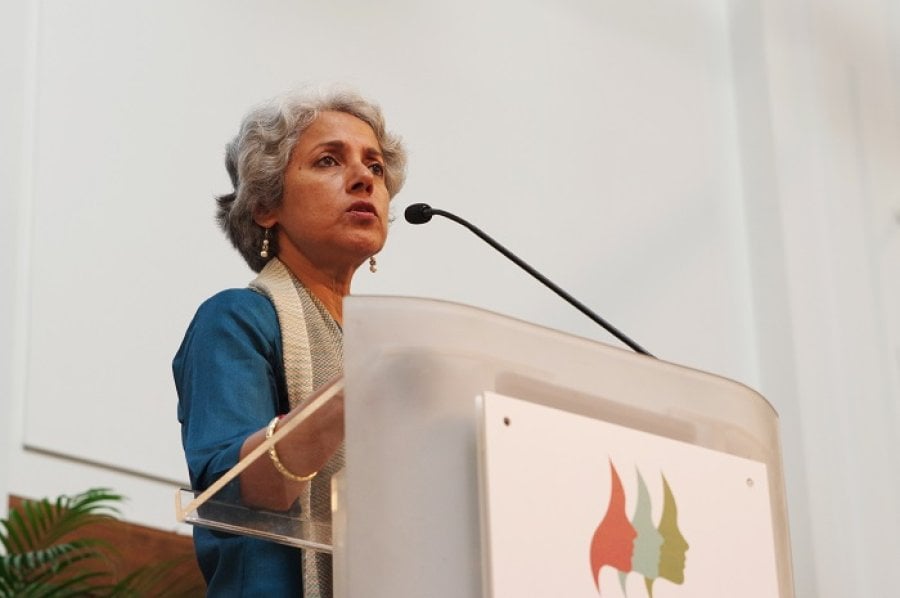Empowerment, mentoring and men – lessons learnt from the Women Leaders in Global Health Conference
15 November 2018 London School of Hygiene & Tropical Medicine London School of Hygiene & Tropical Medicine https://lshtm.ac.uk/themes/custom/lshtm/images/lshtm-logo-black.png
Hosted by the London School of Hygiene & Tropical Medicine over 8 and 9 November 2018, the event aimed to address the diversity of issues in reaching gender equity in health leadership. Globally, women occupy less than 25% of influential leadership positions despite making up 75% of the healthcare workforce.
Mentorship, equity in funding opportunities and peer review panels, and more equal presence on conference panels and other speaking opportunities were among the key factors identified to redress the gender imbalance. In her keynote talk, Dr Swaminathan voiced concern that “we are not listening to people…to the stories that can make all the difference in the way we conceive notions about others”.
Nearly 900 participants from more than 70 countries and 80 nationalities heard from global health leaders in a wide range of talks and panel discussions, on topics ranging from mentoring, gender in emergency outbreak response and political leadership, to the #MeToo movement, media and new technologies.
Professor Heidi Larson, Women Leaders in Global Health Conference Steering Committee Chair, and Director of the Vaccine Confidence Project at LSHTM, said: “We were honoured to host this event and build on the inaugural conference held at Stanford last year. The reaction has been wonderful and I am incredibly grateful to all our participants and delegates who made the two days so special.”
Other participants included Professor Dame Sally Davies, Chief Medical Officer for England; Dr Joanne Liu, International President of Doctors Without Borders; and Xavier Prats Monné, former Director-General for Health and Food Safety at the European Commission.
Xavier Prats Monné said: “It’s a very humbling experience for a man to be in a conference dominated by women. The simple fact of being at a conference such as this is a lesson in itself. Beyond that, I think that it is very important for self-confidence and for confirmation of a just cause, that women get together and speak their minds – and do so loudly.”
The 3rd Women Leaders in Global Health Conference will be held at the University of Global Health Equity in Rwanda on 7 and 8 November 2019.
Professor Agnes Binagwaho, Vice Chancellor of the University of Global Health Equity, said:
“Building upon the momentum that started at Stanford and continued in London, the WLGH19 conference in Rwanda will help to spur on further innovation and creativity in this critical space. In our quest for developing women who will be future global health leaders as well as promoting the mission of gender equity, we must have both women and men at the table. We must work together to achieve these challenging goals.
“Rwanda will serve as an inspiring convening space for bringing together global health leaders of all backgrounds; we eagerly anticipate the meaningful work to come from this gathering as it supports women at every level - from the community, from the health facility, from academia and from all other sectors."
Professor Larson added: “Progress is not always forward moving – these are incredibly fragile and vulnerable political times. We can go 10 steps forward with women’s rights and 20 steps backwards if we have the wrong political leaders. We need to get more diversity in leadership. We must keep the pressure on. I can’t wait for the third Women Leaders in Global Health Conference in Rwanda next year.”
Sadly at least 17 speakers and delegates from low-and middle-income countries in Africa and Asia were denied visas to enter the United Kingdom to attend the Conference. LSHTM Director Professor Peter Piot wrote to the UK Home Secretary Sajid Javid MP to express grave concern about the current visa application process for international academics and scholars to visit the UK for academic conferences. Read more here.
For those who missed the event, many of the talks and panel discussions are available online.
Women Leaders in Global Health 2018 was supported by a number of academic partners and sponsors including Wellcome, Johnson & Johnson, Gilead, Novartis and GSK. With special thanks to the Bill & Melinda Gates Foundation. Full list of partners.
LSHTM's short courses provide opportunities to study specialised topics across a broad range of public and global health fields. From AMR to vaccines, travel medicine to clinical trials, and modelling to malaria, refresh your skills and join one of our short courses today.